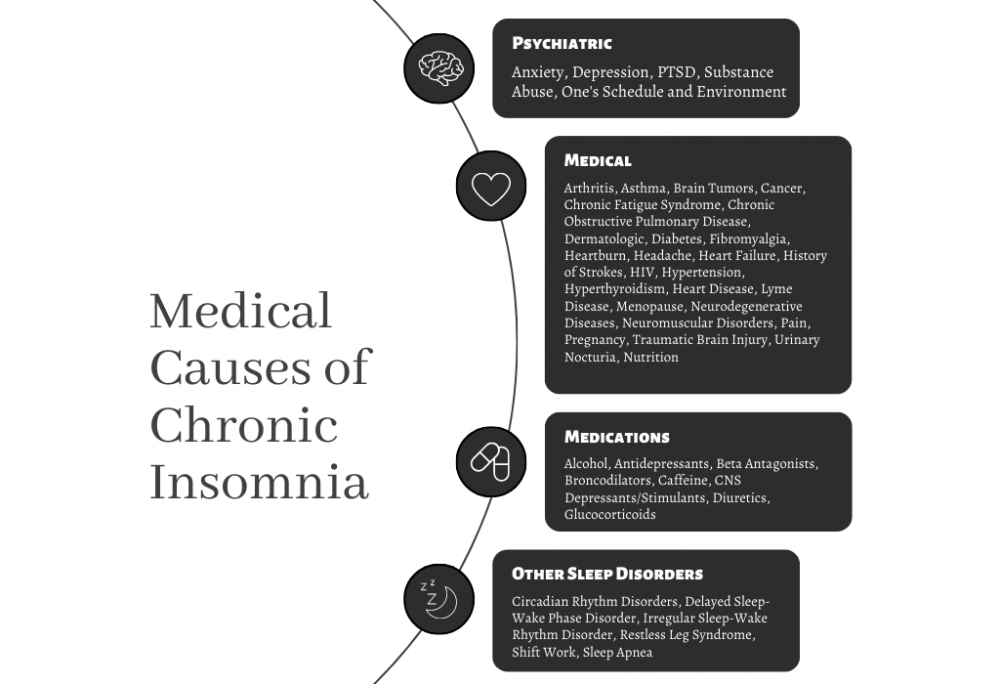
Chronic Insomnia: Cannabis as a Potential Solution
Understanding Chronic Insomnia
Chronic insomnia is a sleep disorder characterized by persistent difficulties in falling asleep, staying asleep, or achieving restorative sleep. The causes for this condition are diverse, but emerging evidence suggests that medical cannabis could offer a promising treatment option. Before exploring cannabis’ potential in addressing insomnia, let’s delve into the various chemical compounds in cannabis and their physiological impacts.
Chemical Compounds in Cannabis: THC and CBD
Cannabis is a complex plant containing over 100 different chemical compounds known as cannabinoids. The two primary compounds are tetrahydrocannabinol (THC) and cannabidiol (CBD). While THC is the psychoactive component responsible for the “high” associated with cannabis use, CBD does not produce intoxicating effects and is known for its therapeutic properties.
How Cannabis Compounds Affect the Body
THC’s Interactions
THC interacts with the brain’s endocannabinoid receptors, particularly CB1 receptors, leading to psychoactive effects. Moreover, THC has sedative and analgesic properties that can aid in relaxation and sleep induction.
CBD’s Role
CBD modulates and enhances the endocannabinoid system, which regulates several physiological processes, including sleep-wake cycles, pain perception, and mood. CBD’s potential anxiolytic and antipsychotic effects could help manage underlying factors that contribute to insomnia.
Cannabis and Insomnia: Potential Therapeutic Applications
Sleep Induction
THC-rich cannabis strains may help reduce sleep onset latency—the time it takes to fall asleep—by activating CB1 receptors, thus promoting relaxation and facilitating sleep.
Sleep Maintenance
CBD is thought to extend sleep duration and enhance sleep quality. By indirectly affecting serotonin receptors, CBD could regulate sleep-wake cycles and provide relief to those who frequently wake up during the night.
Anxiety Reduction
Given that many individuals with chronic insomnia experience heightened anxiety levels, CBD’s anxiolytic properties could help create a more relaxed state, conducive to sleep.
Scientific Research and Studies
Several studies support the potential of cannabis for insomnia treatment. For example, a study published in the journal Medicines found a reduction in insomnia symptoms in 409 individuals across diverse medical conditions. Another study in the Journal of Clinical Sleep Medicine reported subjective sleep improvements in patients using medical cannabis, particularly those with severe baseline insomnia.
However, more research is needed to establish the optimal dosage, mechanisms involved, and any potential long-term effects.
The Promise and Prerequisites
Chronic insomnia can have a profound impact on overall well-being and quality of life. Both THC and CBD in cannabis have demonstrated potential in mitigating insomnia’s underlying causes and symptoms. While existing scientific research is promising, it is vital for individuals to consult healthcare providers for a tailored treatment strategy, given that the field is still evolving.
📗 Note: Think of this diagram as the “light” version. For the full-strength stuff, hit this link to read more in “The Doctor-Approved Cannabis Handbook” 📗.

Cannabis: A Promising Avenue for Chronic Insomnia Management
Cannabis has emerged as a potential therapeutic solution for chronic insomnia, offering an alternative to traditional sleep medications. The active compounds in cannabis, such as THC and CBD, have been found to influence sleep quality, duration, and onset, potentially providing relief for individuals struggling with insomnia.
Clinical trials and patient testimonials highlight the benefits and considerations of using cannabis for sleep disorders, emphasizing the need for personalized dosing strategies and a clear understanding of its safety profile. The role of cannabis terpenes in enhancing sleep quality further underscores the plant’s potential as a holistic sleep aid.
As research continues, the mechanisms through which cannabis affects sleep architecture and the long-term implications of its use for insomnia are becoming clearer. This knowledge is critical for developing targeted cannabis formulations and providing healthcare providers with the information needed to guide patients effectively.
The future of cannabis as a treatment for chronic insomnia looks promising, with ongoing studies aimed at optimizing its therapeutic potential while minimizing risks. Education, regulation, and innovative research are key to fully realizing cannabis’s role in managing insomnia and improving sleep health.

